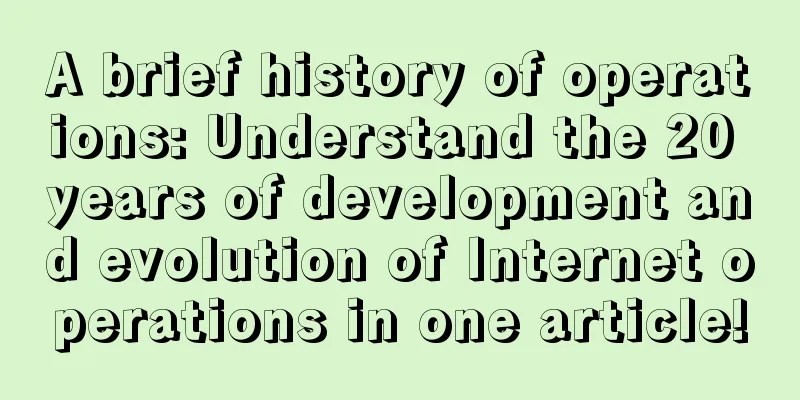Dialogue with Robin Li: When we are at the intersection of the times

|
Three elements for Baidu's successful mobile Internet transformation Zhang Peng: In the past two years, as I just said, it is amazing that Baidu has surpassed traditional PC Internet in mobile Internet traffic, and revenue is just around the corner. The transition period is a very challenging period for many companies. You have pushed this company to complete the leap in the past two years. If you were to choose the three most important core things, the most worthwhile things to do, or the things you think are the right things to do, what would they be? Robin Li: This answer may not be the same for every company, but for Baidu, it is the belief in technology. I think this is the most familiar answer to everyone here. In the past two years at Baidu, we have always felt that technology has not become less important in the mobile Internet era, but has become more important. So in the past two years, we have made a lot of investments in technology, including some long-term investments in artificial intelligence and deep learning, including products that have already been seen and used by everyone, such as voice search. Voice search was not widely used in the PC Internet era because it was silly and strange for everyone to hold a microphone in front of a PC. But today's mobile phones are used to make calls, so it is natural for people to talk to them. In many cases, input is not the most convenient way to express, and voice is the most convenient. For example, how many yen is 108,000, but it is very troublesome to input these. Zhang Peng: We all think that you don’t need to reflect how much money it is. Robin Li: Yes. If you need to input text, it will be very troublesome. These things did not exist in the PC era, or it was not a natural need for users. But in the mobile era, it is a very convenient and natural way of expression. And these things have very high technical requirements. Voice needs to be able to truly recognize what the user is saying, and images are actually more difficult. There are also a lot of technical problems here. We have solved a lot of these problems in the past two years, including connecting people and services. In the past, you could only search for information on Baidu, but now it is easy to search for the nearest movie theater. These technological innovations have made users increasingly rely on Baidu in the mobile era and get what they want on Baidu. The second reason is to be down-to-earth. So why do I have to care about how much a night's stay costs? Because this is what other people care about. In this market, we need to figure out from the user's perspective what they care about, what they care about yesterday, what they care about today, and what they will become tomorrow. This needs to be clarified. When we talk about geeks, many of them are engineers. I think engineers have a big obstacle in being down-to-earth. Usually, they talk about this problem from the perspective of writing programs and codes, so they think that they have expressed it very clearly, very rigorously, without any loopholes, and that even the one in ten thousand problem has been considered, but users feel that they cannot understand it and it is not easy to use. Therefore, you need to understand how this technology is created, or at least understand whether it is technically feasible, and at the same time, you need to be able to say that you know what the user is thinking about, and you can understand how his needs are expressed from the perspective of someone who knows nothing and knows nothing about technology. Therefore, although this requirement does not sound too much, it is very, very difficult to do. Once you understand it, you will naturally want to describe it in a professional way. It is very important that you understand it and can immediately empty your mind and look at the problem from a perspective of not understanding it. Therefore, we must not only understand technology, have faith in technology, and utilize the power of technology, but also be able to look at things from the perspective of an ordinary user. This is not only an experience of Baidu's transformation in the past two years, but also a principle we have always adhered to in the past decade of development. The third reason is something mundane, which is money. I don't know how many people have paid attention to Baidu's financial statements. As a listed company, we disclose our financial statements every quarter. The most recent financial report was released for the third quarter of 2014, with a net profit margin of 29%, which means that for every 100 yuan of revenue, 29 yuan was profit. If we go back two years, that is, to compare Baidu's financial report for the third quarter of 2012, what was the net profit margin at that time? 53%, which means that for every 100 yuan of revenue, 53 yuan was pure profit. In just two years, the profit margin has dropped so much, which actually shows a kind of determination, that is, I am willing to spend money and invest. I don’t care what Wall Street thinks, I don’t care if my stock price drops by half or more, I must make this happen. So I think the investment in the past two years has played a big role in our smooth transition. Zhang Peng: I think these three points are very worthy of your reference. Belief in technology is a basic thing. At the same time, your way of doing things must be down-to-earth and pragmatic. It is really difficult to do things without money. Robin Li: Not only do you need money, but you also need determination. Because China's Internet industry is relatively new, most Internet company CEOs are still founders, but some have become professional managers. We can see that many companies in the United States are run by professional managers. In fact, even if you have money, professional managers would not dare to make such a decision. His profit margin dropped from 53% to 29%, and the board of directors would have said that it was time to change someone. So it's useless to have money. People would not dare to do this. Zhang Peng: So, the core is that the founder must have this mentality. Robin Li: Yes, I know I will still be here in five years and ten years, so I dare to do this. Zhang Peng: The short-term decline in profit margins is for long-term development. Robin Li: Yes. Baidu invested in artificial intelligence 3 years ago Zhang Peng: Belief in technology. We spend time on technology every year. Yesterday, we saw Baidu's bicycle. It was really a bicycle running on the stage. There are also Baidu Eye and Baidu Quick Search, including the deep learning we have been talking about, and even artificial intelligence in the future. I would like to ask a pragmatic question. Is your belief in technology, including the cutting-edge technology that Baidu has developed, because you are a geek and have a passion for technology? Or is it something you have to do? Robin Li: I think it's both. First of all, I am a person with a technical background. I studied computer science in the United States, and later worked on the most core technology in Silicon Valley. So I am very passionate about technology. I feel excited and thrilled when any new technology emerges. So when new technology comes, I think the probability of me grasping it is higher than that of ordinary people. But the second point is very important. As a company, you must be able to judge what this technology means to the company. If this judgment is wrong, it will be disastrous for the company, because technology usually requires a lot of investment. If what you invest is not what the market wants, it will be a big blow to the company. For me, I feel that I am at a very exciting node. It is not only my own interest and hobby, but also what the current market needs. Zhang Peng: So, Baidu is investing in this because it thinks it is inevitable. Why do you think deep learning and artificial intelligence, which we are talking about now, are so important? Most companies still think that this is a very distant thing. Ray Kurzweil came to talk about AI this morning, which is 30 years away, and Baidu started doing this two years ago. Why did you start doing deep learning and artificial intelligence at that time? Is it related to mobile Internet? Robin Li: Yes, the answer to this question is very similar to the previous one. Artificial intelligence is a discipline that has been around for a long time, at least half a century, and probably more than 60 years. So, when I was studying in the United States in the early 1990s, I liked the course of artificial intelligence very much. But at that time, I was very disappointed to realize that artificial intelligence actually had no practical applications, and that the things it did were stupid. So, on the one hand, I liked it, but on the other hand, I thought it was just a fancy thing with no practical value. Until about two or three years ago, I saw some things in the field of artificial intelligence using deep learning methods, and we saw that the results were indeed very good. When I came back to understand and interpret this matter, I realized that the reason why we didn't get good results in artificial intelligence in the past was because our computers were not powerful enough, the calculations were not fast enough, and they were not cheap enough. Everyone knows Moore's Law. When the exponential growth occurs, you may think it has nothing to do with you at first. No matter how fast it grows, it actually has no value. But when it changes from quantitative change to qualitative change, if you don't get in advance, you may be overwhelmed. I have been paying attention to this field more than ten to twenty years ago. When I saw the change from quantitative change to qualitative change, I found that the opportunity had come. Today's artificial intelligence is very different from when I first studied it. Today's computers are really fast enough and cheap enough. We can do things that were impossible before. The original artificial intelligence thought that this thing cannot be done. What it meant was that this thing was too expensive to do, and it required a lot of computers and a long time of calculation to do it. We said it cannot be done. But now, after so many years of exponential growth in computers, it can be done. It is cheap enough and it can calculate fast enough. The effect it brings is very good and has entered the practical stage. This is why we have invested so firmly and generously in artificial intelligence and deep learning in recent years. We are also very happy to see that it has played a great role in our existing business. Zhang Peng: Has it started to work? Robin Li: It's already working. For example, as I just said, when searching in English, using images, or even natural language, it can understand what you are asking, even without using keywords. Even our monetization algorithms, which apply artificial intelligence, have seen many improvements. When I decided to make a large investment three years ago, I thought that the benefits would only come in five or ten years. However, I didn’t expect that after just one or two years, I would already see improvements to our existing business. This was beyond my imagination. Robin Li contributes new patents to mobile Internet Zhang Peng: But today I still want to reveal a little secret, which we discovered ourselves before, and Robin Li did not tell us today. We recently found a patent, the name of this patent is "Object Recognition Method and Device", and I found that the person behind this patent is Robin Li. Is this a patent you participated in? Robin Li: The person who mainly implemented the patent was our engineer, and I contributed some of the ideas. This idea was actually based on our judgment of the wireless Internet era. That is, in the PC Internet era, everyone thought that searching was just entering keywords, and we hoped that when the user entered a limited number of keywords, I could guess what he wanted at the first try. Later, we felt that after the rise of wireless Internet and mobile phones, the user's expectations or the most natural way was no longer this way, so what should be the way? It should be to conduct multiple rounds of guidance and dialogue with users. This is similar to what I just said about knowing what the user wants to express. In many cases, the user only says half of it, and the other half remains in his mind. Pick a few keywords and write them in. This is the PC Internet era. All we see are keywords, and we guess based on limited words. But in the era of mobile Internet, we want users to express what they want more naturally. It doesn't matter if they are not very precise after the first question. We will continue to ask them in the second and third sentences whether this is what they want. We can deduce step by step so that users can get what they want. For example, if I see a wild flower on the roadside and don't know what kind of flower it is, I will take a picture of it. He will first ask what month this flower blooms? How tall is this plant? After asking these questions, he will say what kind of flower it is. Then we will judge the answer he wants. In the PC Internet era, it may only take you two seconds to input a keyword and get a result in less than one second. In the mobile Internet era, users may not care about spending a few extra seconds, but in fact, you can help users organize their thought process. He originally did not understand what he wanted to express, but under your guidance he expressed his needs more and more clearly. In fact, the more he expresses, the higher the probability that we will give him the only correct answer, so we will develop in this direction in the future. Zhang Peng: This kind of multi-round question-and-answer system allows users to express their needs more accurately. Another patent is the patent for hyperlink analysis. Yaqin shared it on Weibo a few days ago, and he also cited your patent for hyperlink analysis. That patent locked in the value of Baidu, a company of this scale worth 80 billion US dollars this year. We would like to ask, will the second patent containing your name be worth a large market value in a dozen years? Robin Li: When I came up with the patent for hyperlink analysis in the 1990s, I really didn't think it could make a lot of money. Even until the beginning of 2000, when I started to establish Baidu, I only knew that many people would need a search engine and I would make it a success. I didn't expect it would make a lot of money. So, strictly speaking, the patent for hyperlink analysis only makes it more convenient and equal for everyone to obtain analysis. The reason why it has a market value of 80 billion US dollars today is still the same as my starting point today. We found that the search engines in the past could not solve the problem. In the past, search engines only extracted a few keywords, which was a huge burden for users. If the user did not say it completely, I would help him to complete it. In this way, he can get what he wants without any perception or pain. At the same time, we also know what he wants. I think this definitely represents the future. In another five to ten years, the main way people obtain services and information will become through multi-round conversations rather than just entering keywords. The Internet will improve efficiency in all industries Zhang Peng: Last year, you accurately predicted that the service industry would usher in a wave of major changes, and this change would benefit many service industries from the development, popularization and changes of mobile Internet. As a result, this year we have seen that all kinds of business forms in the entire service industry are accelerating their Internetization, including from the level of Baidu Takeaway. Of course, we are also very happy about the subsidies. Many geeks present here have received good subsidies for their dinners. At this level, we would like to ask one more question: if the development of the service industry this year is a dividend of mobile Internet, what do you think we need to focus on next? Which other industries should accelerate their evolution towards the Internet? Li Yanhong: I think the impact of the Internet on the entire society or economy is comprehensive, almost all-encompassing, with no blind spots. So we only saw in the early days, or in the past 15 years, we saw that retail has been shifting to the Internet in big strides, we saw that media is becoming more and more Internet-based, we saw that finance is gradually beginning to accept the Internet, and the next step is that we will see services. This year, many entrepreneurial companies are doing this, including BAT, but this is just the beginning. In fact, we still need to solve the problem of low efficiency. If you can raise the occupancy rate of a restaurant to 80% with a 30% occupancy rate, then the restaurant will earn a lot of money. For example, if the occupancy rate is 30%, the restaurant will earn 10,000 yuan, and if the occupancy rate is 80%, the restaurant will earn 50,000 yuan. However, the cost will not increase in proportion. In this way, the restaurant will earn more and the utilization rate of these resources will increase. It is a waste to leave tables and chairs there without anyone using them. All service industries are facing this problem. How many empty seats are there on the plane? No one sings at 8 o'clock in the morning in karaoke? Only 50% of the people watch movies at 2 o'clock in the afternoon. We are solving these problems. If there is Baidu Takeaway, restaurants can sell more dishes and be more efficient through the Internet. In the future, for any industry, we will see that efficiency will be improved by doing things the same way on the Internet. This is the greatest contribution of the Internet to mankind, not the impact of technology on the geek circle or the changes in engineers' behavior, but the changes that have taken place in everyone in society because of mobile Internet. Zhang Peng: So, what Robin Li said today is very consistent with today's theme "Awakening, Evolution". So, today I feel that there is a change in the scene. In the past, the visitors were programmers, product managers, and standard geeks, but this year, we saw from our backstage that there are many people from traditional industries who are seeking change, or industry rebels. This group of rebels may have to create a new model. The geek population is also expanding, and the spirit of continuous exploration is becoming something that everyone believes in. Robin Li has been here for three years and has inspired everyone to have a new understanding of geeks. I will also reveal that Robin Li has also attracted hundreds of geeks to join Baidu in the past three years. Robin Li: Thank you very much for helping us attract a lot of talents. Zhang Peng: A company with a geeky temperament will naturally attract such people. Today, it is not just programmers and technical people. What advice do you have for everyone? How should we view the geek spirit? How do we view the exploration of new things, changes, and the unknown? Li Yanhong: I think it's great. I just heard you say that in addition to the traditional geeks, engineers and managers, there are also rebels from traditional industries. I think they are pioneers. They realized the changes that the Internet has brought to them earlier. I think the participation of these people will play a very important role in our ability to better use Internet products and technologies to change the world. In fact, I also said last year that the future development direction of product managers is either to go left or right. Going left means deepening the traditional way, while going right means understanding the real needs of the industry and doing it in a new way. The combination of the two will change the mainstream industry, not just the Internet industry. Zhang Peng: I think the geek spirit is also expanding, from the belief and pursuit of technology to whether I can change some unreasonable things in a more effective way. In China, everyone does not like change, because it will leave your comfort zone. We are at the intersection of a revolutionary era and in the tide of change. What should we do? Should we respond with a positive attitude? Li Yanhong: Yes, maybe it’s different for different people. For me, I really like change from the bottom of my heart. In fact, for most people, change is a painful feeling. They just got used to this and suddenly changed to that. But the development of the IT industry over the years, from the Internet to the mobile Internet, I think what really excites me is the reason why I get up very early every day. I can always feel the changes. Every day is new for us. I think many geeks may also have this mentality, and they really want to see more changes. Zhang Peng: So he was curious. Li Yanhong: Yes, he hopes to change the world with his own abilities. No matter how many people outside do not understand his ideas, I am determined to change the world with my own abilities. Today, China can not only change the world with pure technology, but also change the world by combining with traditional industries. I think there are many opportunities for these geeks. It can be said that this is a magical era, and there are really many things to do. |
<<: How to create a mobile game in Japan that generates over 100 million yuan in monthly revenue?
>>: Broken Lollipop: Five things that need to be fixed in Android 5.0
Recommend
Teach you to thoroughly understand the KMP algorithm from beginning to end
[[121931]] References for this article: Data Stru...
2020 Double Eleven strategy, 2020 Double Eleven activity strategy!
2020 Double Eleven strategy, 2020 Double Eleven a...
Overseas promotion and marketing, Facebook advertising process!
With its huge user base and increasingly sophisti...
Cool appearance suspected to be ZTE V5 new flagship product exposed
The new ZTE V5 has been exposed for some time. Pr...
Do users hate Tik Tok marketing? Missing these 4 experiences!
Today's "consumer behavior" is very...
How to get the “traffic key” of the Winter Olympics hot spots?
During the past Spring Festival holiday, Video Ac...
What should we do to retain users?
How can we avoid loss of users that we have worke...
APP marketing methodology: event marketing, down-to-earth, and learning from each other's strengths and weaknesses
For a business, there are too many ways to promote...
The secret to quickly improving website rankings? Principles + operations + Q&A, all here!
1. Principle The three core steps of SEO are: web...
How to plan group buying activities on mini programs?
The author was recently responsible for designing...
Changsi Advertising Double "Egg Festival" big rewards to help developers realize efficient monetization
2014 is coming to an end, and a busy year is abou...
Creating JavaScript modules with Babel and ES7
Last year, a new version of JavaScript was releas...
10 minutes to sort out: 6 ways to go from traditional marketing to growth hacking!
In March 2017, Coca-Cola , the world's larges...
Code practice for handling i18n international telephone area codes
Preface Last week, I was busy with the internatio...
Are you ready for an in-depth look at Android 7.0?
On August 22, 2016, Google officially pushed the ...









